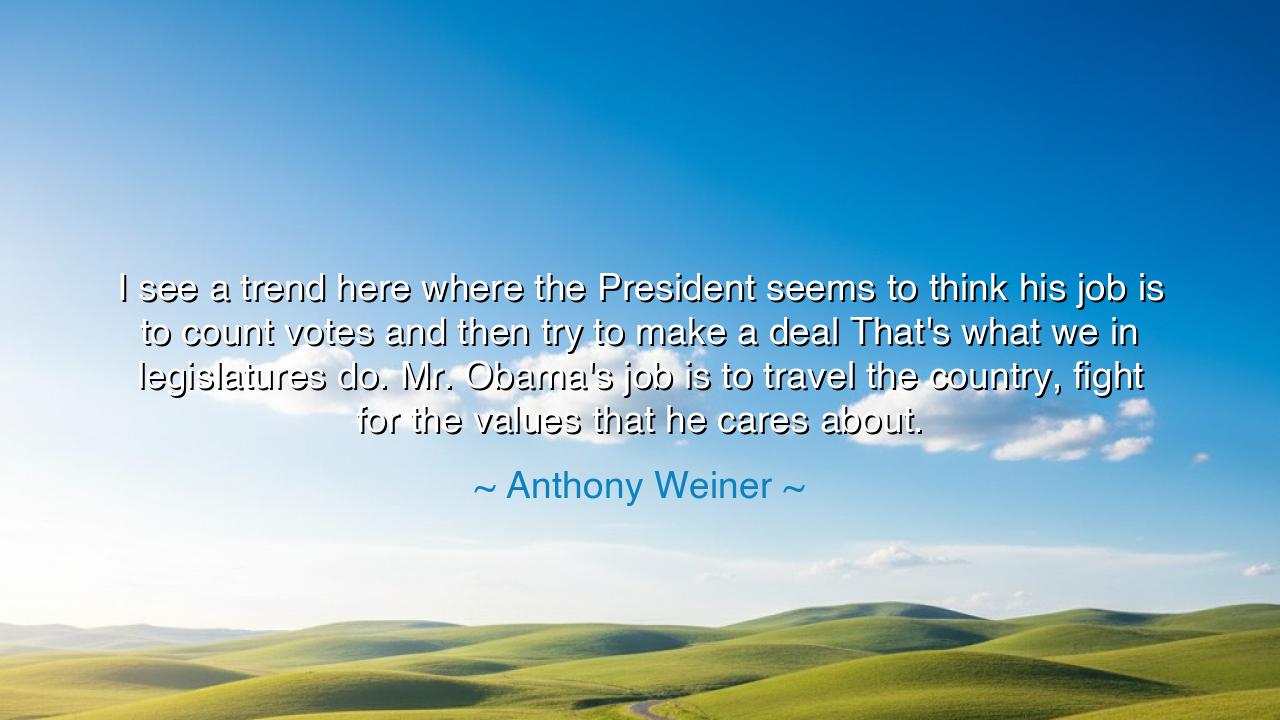
I see a trend here where the President seems to think his job is
I see a trend here where the President seems to think his job is to count votes and then try to make a deal That's what we in legislatures do. Mr. Obama's job is to travel the country, fight for the values that he cares about.






The words of Anthony Weiner — “I see a trend here where the President seems to think his job is to count votes and then try to make a deal. That's what we in legislatures do. Mr. Obama's job is to travel the country, fight for the values that he cares about.” — reveal a profound reflection on the difference between leadership and negotiation. In them, he speaks of roles, of duties, of the sacred responsibilities of office. For while legislators must shape laws through compromise and counting, the President, as the embodiment of a nation’s spirit, must rise beyond numbers and embody the guiding star of values.
The distinction is not small. To count votes and to strike a deal is a craft of politics, necessary but bound to the mechanics of governance. But the role of the President is higher: it is to inspire, to embody, to summon a people toward vision. A nation cannot be guided by tallying alone; it must be led by conviction. The President must not merely respond to the world as it is, but call the people toward what it can become. Here lies the ancient truth: that true leadership is not the arithmetic of compromise, but the poetry of vision.
History offers many witnesses to this truth. Consider Abraham Lincoln, who faced a nation torn apart by civil war. He did not only count votes in Congress or strike bargains with rivals; he traveled the land, he spoke with passion of freedom and union, he lifted the nation’s heart toward the dream that "government of the people, by the people, for the people, shall not perish from the earth." Without such conviction, the machinery of politics would have collapsed. His greatness lay not in deals alone, but in his unshakable devotion to values higher than compromise.
Or think of Winston Churchill during Britain’s darkest hour. When his people stood on the brink of ruin, he did not speak of deals with tyranny, nor of votes in Parliament alone. He spoke of values — of courage, of resistance, of the indomitable will to fight. He traveled the nation and the world, lending his voice as a flame in the darkness. It was this leadership, rooted not in numbers but in spirit, that steeled his people to endure the storm. This is the kind of calling Weiner alludes to when he says the President’s task is not only negotiation, but the defense of ideals.
Yet there is wisdom too in remembering that leaders must balance both. A President cannot ignore votes and laws, for the structure of democracy requires the weaving of vision with action. But when the focus rests too much on the counting, the people lose their star. When the leader is reduced to a broker of deals, the soul of the nation falters. Thus, Weiner’s words are a warning: do not let leaders forget their higher purpose. They must fight for values, even when compromise is tempting, for without values, compromise itself becomes hollow.
The lesson for us is clear: in our own lives, do not mistake negotiation for leadership, nor numbers for truth. Whether in family, community, or nation, the truest leaders are those who rise above arithmetic and speak from the soul. To lead is to inspire, to embody conviction, to travel the path of courage even when the outcome is uncertain. Compromise has its place, but values must light the way. Without them, we drift in shadows.
Practical wisdom follows. If you hold a role of leadership, ask yourself not only, “What will succeed?” but “What do I stand for?” Speak to the hearts of those you guide. Travel beyond the comfort of your chambers, walk among the people, and let their struggles shape your voice. Do not shrink your role to the counting of votes, but expand it to the proclaiming of ideals. In doing so, you will awaken others not merely to agreement, but to belief.
So remember, child of tomorrow: deals fade, but values endure. Votes are counted, but convictions inspire. The true calling of a leader is not only to govern but to guide, not only to negotiate but to awaken. This was the wisdom behind Anthony Weiner’s words, and it remains the eternal measure of leadership: to stand for what is right, and to carry that flame across the land until others, too, are lit by its fire.






AAdministratorAdministrator
Welcome, honored guests. Please leave a comment, we will respond soon